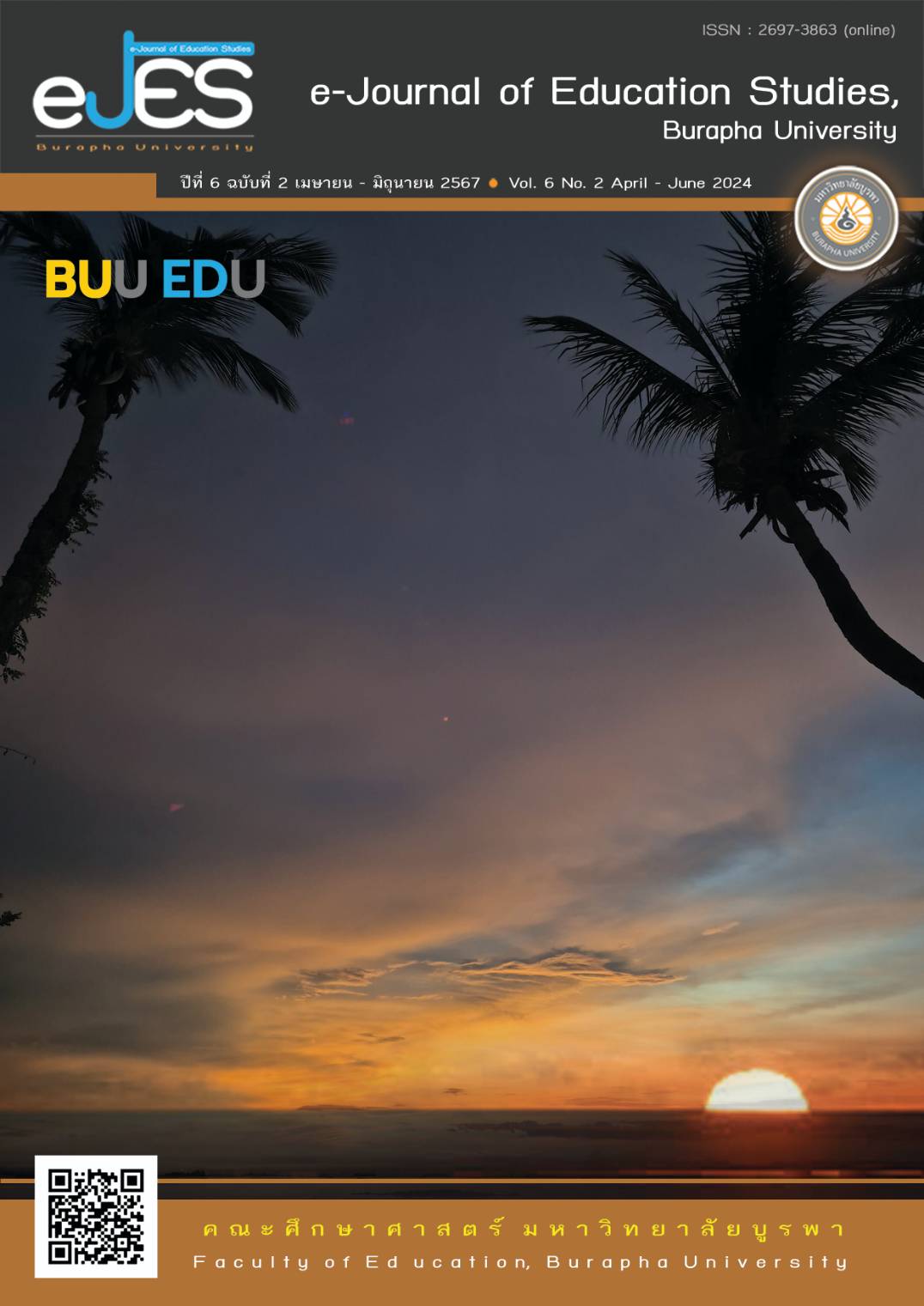The Use of Augmented Reality Direct Vocabulary Instruction Based on Cognitive Theory of Multimedia Learning to Enhance Vocabulary Knowledge of Thai University Students
Main Article Content
บทคัดย่อ
The potential of augmented reality to merge the real and computer-generated world together can revolutionize the vocabulary field. This study aimed to 1) investigate the effectiveness of the use of augmented reality direct vocabulary instruction based on cognitive theory of multimedia learning to enhance vocabulary knowledge of Thai university students and 2) explore the perceptions of Thai university students towards the instruction. This study employed a one group pre-posttest research design. Twenty Thai university students from the second to fourth year at a public university in Bangkok participated in this study for 10 weeks. The instruments were lesson plans with AR flashcards, pre-posttest, questionnaire and interview. The data was analyzed using paired-sample t-test, mean, SD and thematic analysis. The results showed that 1) there was a significant improvement of students’ vocabulary knowledge at p 0.001. and 2) students had positive perceptions towards the instruction as they found it interesting and useful, agreeing to apply it outside classrooms. The augmented reality direct vocabulary instruction based on cognitive theory of multimedia learning enhances vocabulary knowledge systematically with an overlay of sound, pictures and real situations. It can also become part of students’ future self-learning.
Article Details
เอกสารอ้างอิง
Archer, A. L., & Hughes, C. A. (2011). Explicit instruction: Effective and efficient teaching. New York: Guilford Publications.
Beck, I. L., McKeown, M. G., & Kucan, L. (2013). Bringing words to life: Robust vocabulary instruction. New York: Guilford Press.
Binhomran, K., & Altalhab, S. (2021). The Impact of Implementing Augmented Reality to Enhance the Vocabulary of Young EFL Learners. JALT CALL Journal, 17(1), 23-44.
Brysbaert, M., Warriner, A.B. & Kuperman, V. (2014). Concreteness ratings for 40 thousand generally known English word lemmas. Behav Res, 46, 904-911.
Faraj, A. K. A. (2015). Effective Strategies for Turning Receptive Vocabulary into Productive Vocabulary in EFL Context. Journal of Education and practice, 6(27), 10-19.
Hung, Y. H., Chen, C. H. & Huang, S. W. (2017). Applying Augmented reality to enhance learning: a study of different teaching materials. Journal of Computer Assisted Learning, 33, 252-266.
Imamee, W. (2016). Investigating Thai EFL Students English Vocabulary Learning Strategies at A Private University (Master’s thesis). Thammasat University, Bangkok.
Jaiprasong, S., & Pongpairoj, N. (2020). L2 Production of English Word Stress by L1 Thai Learners. LEARN Journal: Language Education and Acquisition Research Network, 13(2), 142-157.
Kaenchan, P. (2018). Examining Thai Students Experiences of Augmented Reality Technology in a University Language Education Classroom (Doctoral dissertation). Boston University, Boston.
Lin, C. C., & Tseng, Y. F. (2012). Videos and Animations for Vocabulary Learning: A Study on Difficult Words. Turkish Online Journal of Educational Technology-TOJET, 11(4), 346-355.
Mayer, R. (2005). Cognitive Theory of Multimedia Learning. In R. Mayer (Ed.), The Cambridge Handbook of Multimedia Learning (pp. 31-48). Cambridge: Cambridge University Press.
Palaigeorgiou, G., Politou, F., Tsirika, F., & Kotabasis, G. (2017). FingerDetectives: Affordable augmented interactive miniatures for embodied vocabulary acquisition in second language learning. In European Conference on Games Based Learning (pp. 523-530). Berkshire, UK: Academic Conferences International Limited.
Parmaxi, A. & Demetriou, A. (2020). Augmented reality in language learning: A state of the art review of 2014–2019. Journal of Computer Assisted Learning, 36, 861-875.
Perry, B. (2015). Gamifying French language learning: A case study examining a quest-based, augmented reality mobile learning-tool. Procedia-Social and Behavioral Sciences, 174, 2308-2315.
Pickens, J. (2005). Attitudes and perceptions. Organizational behavior in health care, 4(7), 43-76.
Ritthirat, N. & Chiramanee, T. (2014). Problems and Obstacles to Developing English Speaking Skill of Thai University Students (Thesis). Prince of Songkla University, Songkla.
Saltan, F., & Arslan, Ö. (2016). The use of augmented reality in formal education: A scoping review. Eurasia Journal of Mathematics, Science and Technology Education, 13(2), 503-520.
Santos, M. E. C., Lübke, A. I. W., Taketomi, T., Yamamoto, G., Rodrigo, M. M. T., Sandor, C., & Kato, H. (2016). Augmented reality as multimedia: the case for situated vocabulary learning. Research and Practice in Technology Enhanced Learning, 11, 1-23.
Sasum, S., & Weeks, B. (2018). Why some Thai students cannot speak English fluently. In Proceedings of RSU International Research Conference 2018 (pp. 361-367). Pathumthani: Rangsit University.
Sharakhimov, S., & Nurmukhamedov, U. (2021). Assessing Learners' Productive Vocabulary Knowledge: Formats and Considerations. English Teaching Forum, 59(4), 16-25.
Sinturat, T., Kosashunhanan, K., Iamlaor, A., Khunasathitchai, K., & Teptong, N. (2022). English Speaking Problems of Engineering Students: A Case Study of Rajamangala University of Technology Thanyaburi. Journal of Roi Kaensarn Academi, 7(5), 1-9.
Solak, E., & Cakır, R. (2016). Investigating the role of augmented reality technology in the language classroom. Croatian Journal of Education: Hrvatski časopis za odgoj i obrazovanje, 18(4), 1067-1085.
Taskiran, A. (2019). The effect of augmented reality games on English as foreign language motivation. E-Learning and Digital Media, 16(2), 122-135.
Teng, M. F. (2023). The effectiveness of multimedia input on vocabulary learning and retention. Innovation in Language Learning and Teaching, 17(3), 738-754.
Thongchu, S., & Adipat, S. (2022). The Development of English Vocabulary Writing Skill by Using Augmented Reality (AR) Technology for High Vocational Certificate Students. Journal of Modern Learning Development, 7(4), 1-9.
Tyson, M. (2021). Impact of Augmented Reality on Vocabulary Acquisition and Retention. Issues and Trends in Learning Technologies, 9(1), 3-26.
Weerasinghe, M., Biener, V., Grubert, J., Quigley, A., Toniolo, A., Pucihar, K. Č., & Kljun, M. (2022). Vocabulary: Learning vocabulary in AR supported by keyword visualisations. IEEE Transactions on Visualization and Computer Graphics, 28(11), 3748-3758.
Yawiloeng, R. (2020). Second language vocabulary learning from viewing video in an EFL classroom. English Language Teaching, 13(7), 76-87.



